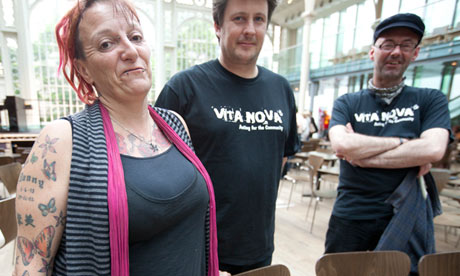
When the former Conservative cabinet minister Sir George Young famously said: "The homeless are what you step over when you come out of the opera," a debate was sparked at the shelter where a young opera critic, Matthew Peacock, worked as a volunteer. "A discussion began about what homeless people needed and wanted. It wasn't blankets and housing: they wanted to show the public what homeless people can do. It was about restoring pride," he says.
From that conversation grew the company Streetwise Opera – which, with Peacock as its founding chief executive, now has a string of critically acclaimed productions to its name. And this week, the story has turned full circle, as Streetwise and a host of other homeless or ex-homeless performers take over the Royal Opera House.
The event, With One Voice, is part of the London 2012 festival – the first time that homeless people have been given a platform at an Olympic Games. Instead of being, in Peacock's words, "overlooked, made unwelcome, or, worst-case scenario, moved on".
All day on Monday, the Royal Opera House was alive with the sound of 300 people preparing for the night's performance. The Floral Hall rang to the sound of rap collectives and choirs; the Crush bar, with its imposing gilt walls, sconces, velvet chaises and glittering chandeliers, hosted poets and songwriters. Neatly dressed bar staff, who tomorrow would be pouring champagne for ballet-goers, wielded bags of sandwiches to fuel the rehearsals and soundchecks. While Tony Hall, Covent Garden's chief executive, beamed at all comers ("So proud to have you here"), Andrew McCutchion, Paul Hawkins and Jane Cartwright prepared for their performance of poems – the product of writing workshops undertaken with Vita Nova, a Bournemouth-based theatre company that works with people recovering from addiction.
McCutchion did a degree in music before his problems started and he ended up addicted to alcohol ("I drank my housing benefit," he says). If a corner of him had dreamed, when he was growing up, of one day performing at the Royal Opera House, "this was not quite," he says, "the route I anticipated". Paul Hawkins, who is also performing with Vita Nova, agrees. "It's been quite a roundabout route, hasn't it? But to be able to highlight the creativity and expression of homeless people is very powerful. It's about time that homeless people were given this kind of platform – it's an opportunity to break down prejudices." He grins. "I'm appalled at all the money being spent on the Olympics, frankly, but having a bit diverted into this is quite nice."
Bryan Morrison is performing his own songs at the Royal Opera House. A former architect, he became homeless after mental health problems. He encountered Streetwise Opera at a shelter he used to visit for meals.
For him, the Covent Garden evening is about "highlighting the fact that homeless people have dignity, purpose, direction and the discipline to perform. They shouldn't be written off as no good."
Samantha Ashleigh Hayhurst, a qualified music teacher, is another reminder that homelessness is no respecter of class or education. For her, the breakdown of a relationship and mental-health problems clashed, causing her life to unravel; she now lives in a hostel and hopes, once she is more robust, to apply for teaching work. Performing her own songs "makes me feel I can actually do something – and that the painful things I have experienced can turn into something positive," she says.
Three ex-servicemen based in Aldershot step into the Crush bar to sound-check for their performance. Trevor Jeffreys, Josh Caddell and Graham Culton all faced difficulties when they left the army. According to Jeffreys, "You'd always been told what to do and when to do it. And at the end, it's a case of: 'Cheers, bugger off.'" For him, composing "takes my mind away from coping with depression"; Caddell has found in poetry a way of "breaking things down and putting them into words; of expressing the way you feel".
Peacock hopes that every Olympics from now on will give homeless people a platform. "It is a political statement," he says. "This is the place where homeless people deserve to tell their stories. It's about people having a voice."
According to McCutchion, what the performers want the audience to take away with them is "the quality of the work. That while homelessness is the platform, the work is valid on its own terms."

